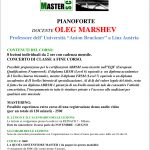THE EVENING POST
May 29, 1998
RUSSIAN PIANIST FORMIDABLE TALENT
What: Oleg Marshev (piano), Prelude in G minor (Bach/Ziloti), Polonaise in C sharp minor Op 26 No 1, Barcarolle Op 60 (Chopin), Petrarch Sonnet No 104 and Study in F minor (Liszt), Sonata No 2 Op 36 (Rachmaninov)
Where: St Andrew’s On The Terrace, Wednesday lunchtime
Oleg Marshev is a formidable talent. Trained at the Gnessin School in Moscow Marshev is also an all-round disarmingly nice person. Responding to a standing ovation from the audience, he played Shchedrin’s A la Albeniz as the first encore, and then with a wry gesture, he sat down and played another finger-smashing piece – Prokofiev’s Suggestion Diabolique.
The programme’s similarities with Michael Houstoun’s last week were interesting – Bach, Chopin, Liszt in both and then Rachmaninov instead of Houstoun’s Ravel.
A transcription by Siloti of a Bach organ prelude, stunningly played with an uncanny, organ-like dynamic flavour, seemed surprisingly close to original. He played the two Chopin pieces almost without pause, perhaps because they were in closely related keys, but that reduced the piquancy at the beginning of the Barcarolle.
But there was always a brilliant sensibility, a rapturous, passionate quality to its endless melody, In Liszt and Rachmaninov, the formidable technician emerged. I’m not sure whether the Rachmaninov sonata is his most interesting work, though the Non allegro – Lento movement had a calm beauty that was remarkable in its pyrotechnic surrounds, and the audience was held spellbound. The Petrarch Sonnet 104 is quintessential romantic Liszt, and Marshev’s sudden climaxes bursting from flawless, fluid torrents of scales and arpeggios were a marvel.
Sacheverell Sitwell said about Liszt’s impossibly difficult Transcendental Studies (No 10 in F minor) that there were “but a half dozen executants who could do justice to their beautiful hardships”. That was 60 years ago; there are more today. But Marshev is still in pretty select company, and he is absolutely the finest pianist in the country this week.
Members of the audience who were absent will never forgive themselves – music critics are allowed the odd oxymoron.


